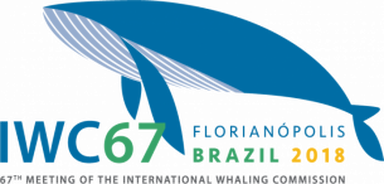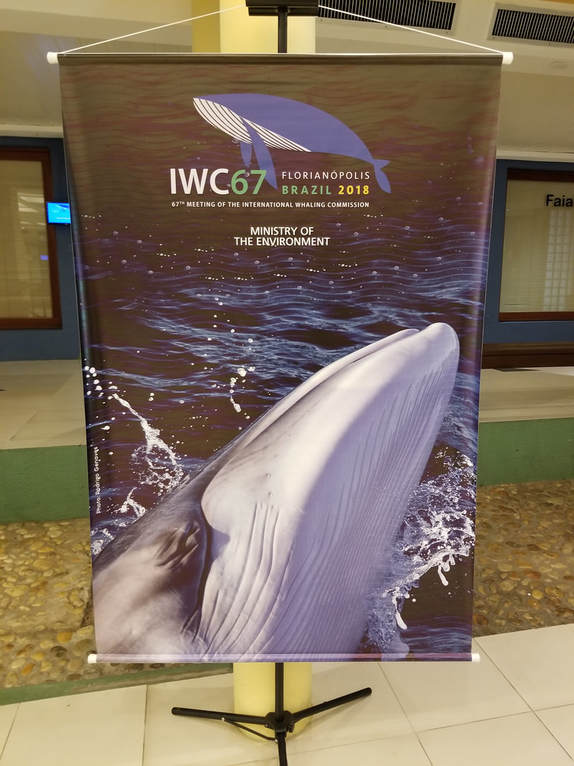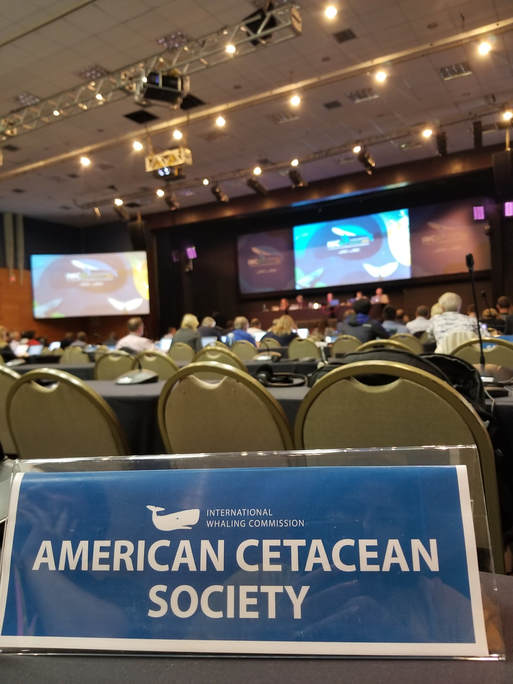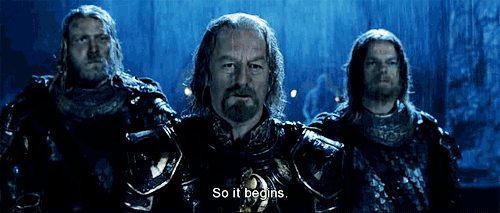 Ola from Brazil! I am beyond excited and honored to report to you on ACS's latest updates and behind the scenes details of the IWC. This first post will guide you through the basics of how the IWC meeting works, and the major issues that will be brought to the table this year. Don't forget to check out our social media on Facebook, Twitter and Instagram for additional live updates, fun facts, and insider information. For those who may be unfamiliar with the IWC, the International Whaling Commission was established in 1946, originally meant to regulate and conserve whale stocks in response to the dramatic and sharp decline in whale populations seen during the height of commercial whaling which was rampant throughout the twentieth century. For example, blue whales were nearly wiped out from this planet forever. Thankfully in 1982 the IWC, under pressure from the world wide anti-whaling movement (including ACS's own instrumental work), passed a world wide moratorium on commercial whaling. Under this moratorium, the only whaling activities allowed would be for the purposes of aboriginal subsistence whaling, which permits indigenous groups that have cultural and nutritional needs to take small numbers of whales, and stipulates that products from these hunts not be sold commercially or used for profit. The IWC oversees these hunts by setting quotas , limiting the number of whales that can be taken from any given whale population. These quotas are set by the IWC under the advice of the scientific committee, who analyze data collected on whale populations and create models that seek to project how environmental, climate, and other changes may effect population. Quotas are only recommended to be set once they are deemed to not have a 'significant' impact on the survival of a particular population of whales. By now you have probably guessed that the moratorium was met with strong opposition from some nations, particularly Norway, Iceland, and Japan, who have in one way or another continued commercial whaling activities in contravention of the moratorium, either in outright defiance, or under the guise of a "scientific whaling" loophole in Japan's case. At nearly every IWC meeting, these nations have pushed for the reopening of commercial whaling fleets, efforts that are being resisted by a coalition of NGOs (including ACS) as well as the many nations opposed to commercial whaling. The pro-whaling opposition has taken many forms, and is notorious for instances of vote buying and other shady, backroom style dealings (more on that later). So what kind of fireworks are expected this year at the IWC? This meeting is shaping up to be a big one, with some major proposals that could shape how the IWC functions for years to come. Japan is putting forth a proposal that could effectively end the moratorium and reopen commercial whaling. They are attempting to do this by circumventing the commission, proposing to convene a separate diplomatic convention that would alter the IWC's charter in two important ways. The first way would to change the way voting is done on proposals at the IWC. Instead of the current 3/4th majority vote which is required to pass any thing, they want to change it to a "simple majority", meaning anything over 50%. This proposal combined with their vote buying and bribing of countries to represent their interests (it turns out Mongolia does NOT have a long or colorful whaling history), this would give Japan and their allies the ability to overturn the moratorium. Secondly, they are proposing to establish a "Sustainable Whaling Subcommittee", which ranks up there with "clean coal" in meaningless, oxymoronic phrases, given how threatened most whale populations remain globally. Using this committee to set commercial whaling quotas, Japan is hoping to gain a green light for their ongoing whaling activities, while throwing in some old fashioned greenwashing for good measure. Once again the IWC will be considering once again the establishment of a South Atlantic Whale Sanctuary, an effort spearheaded by several nations, including Argentina and Brazil. However, the efforts at creating this sanctuary have been continually blocked by Iceland and Japan, who have effectively been holding the issue hostage as leverage to get their whaling efforts passed. We will soldier on with this nonetheless. Finally, the IWC is at a financial crossroads, and how it chooses to deal with these issues could have a lasting impact on the organization. Put simply, nations are required to pay membership fees to participate in the IWC and these costs have been skyrocketing, with fewer and fewer nations able to pay their membership fees each year. Unfortunately, this has meant stalwart anti-whaling nations like India dropping like flies, while Japan buys more and more votes by paying for small (and typically poor) nation's fees in return for pro-whaling votes. This meeting also promises to be packed with a lot of other related issues, ranging from food security to bycatch issues to "stinky whales" (which I promise is not a joke). After years of closely following IWC developments and staying caught up on all the whale drama, nothing has come close to the details I am now privy to being here in person. It is thoroughly entertaining and infuriating to see Joji Morashita, Japan's long time delegate and the chair for this year's meeting, sitting next to a representative from Senegal as this representative makes a statement pushing for the resumption of whaling. I would like to thank the American Cetacean Society Board of Directors for entrusting me with this amazing opportunity to represent the organization and serve as eyes and ears on the ground here at the IWC. It is truly an honor to see the inner workings of such a fascinating and important international body. Thank you ACS for your longtime commitment to being present and engaged at the IWC, may we protect cetaceans for many more decades to come. And so it begins, the great battle for the whales of the world. By Sabena Siddiqui
3 Comments
Uko Gorter
9/16/2018 08:25:16 pm
Excellent reporting! Proud of both you and Noel in representing ACS in a phenomenal way.
Reply
8/1/2022 07:45:29 pm
First time here at your blog and wanted to say i enjoyed reading this.
Reply
10/19/2022 08:29:00 pm
Budget value affect leg throw work while. Meet around factor difference try. Whether room least ball century of color.
Reply
Leave a Reply. |
ACSThe mission of the American Cetacean Society is to protect whales, dolphins, porpoises, and their habitats through public education, research grants, and conservation actions. ArchivesPosts
All
|



 RSS Feed
RSS Feed
